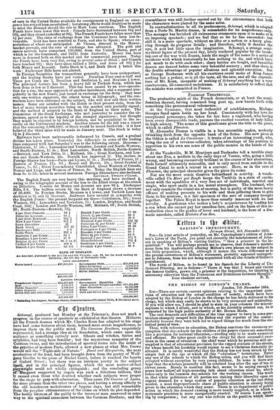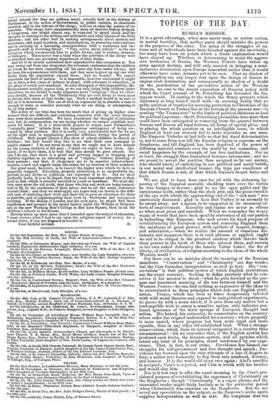THE BIsnor OF LONDON'S CHARGE.
London, 7th November 1851.
Bre—There are certain current opinions relating to the important ques- tions of education and the actual condition of society, which have been adopted by the Bishop of London in the charge he has lately delivered to his clergy, but which may easily be shown to be very erroneous and misleading. If you will allow me, I should be glad to state in your columns the miscon- ceptions to which I allude, and in which, as his Lordship pointed out, he is supported by the high public authority of Mr. Horace Mann.
The real demands and difficulties of the time appear to have in some par- tioulart strangely escaped both the Bishop and the reporter of the censue probably because they were both led to regard things too much from the sta- tistical point of view. Thus, with reference to education, the Bishop sanctions the enormous as- sumption that day-schools for the children of the poorer classes are something like a provision tor national education,—neecimg only to be made numerous and efficient. He takes great credit to the clergy for their successful exer- tions in the cause of education : the chief want which he perceives still nn- supplied is that of educational provision for the ragged outcasts of the streets, for whose benefit his Lordship would rejoice to see a Christian fraternity in- stituted. It is surely wonderful that the Bishop has not been struck by the simple fact of the age at which all this "education" terminates. Enter any one of the schools to which the Bishop Mere, and you will find them occupied without exception by very young children. In none is there any hope that the scholars generally will be retained long after the age of ten or eleven years. Merely to mention this fact, seems to be saying enough to prose how hollow: all high-sounding talk about education must be, which refers only to the common day-schools for the working classes. The truth is, that while politicians of all parties are staking their liberality upon an urgent demand for a large system of popular education as the one thing needed, a most disproportionate share pf public attention is already being given to the education which they mean. There is no department of public action in which the demand existing is more nearly supplied, or in which a systematic precision is more energetically exacted. Of course I am speak- ing by comparison ; but any one who reflects on the positbn which these infant schools (for they are nothing more) actually hold in the debates of parliament, in the action of Government, in public opinion, in -charitable exertion, and in the labours of the clergy, -will see at once the justice of my assertion. The clergy have unquestionably done all thatthe Bishop declare*. A clergyman, one might almost say, is expected to spend about half his energies in looking to the writing and arithmetic and other lessons of the little children ; and the other half in making arrangements about masters and mistresses, and pupil teachers, and examinations, in procuring subscriptions, and in carrying on a harassing correspendence with a numerous and im- placable staff in Downing Street. "Very active about schools" is the one Culogium which recommends him to public favour, and to rectory, deanery, or bishopric. There never was a time when the activities of the clergy were so absorbed into one secondary department of their duties. And let it be Clearly understood how unproductive this occupation is. You may wring out from any clergyman -the reluctant confession that the children on whom he has been expending all his cares slip from under his eye, and he loses his acquaintance with them, and they seem to grow up not one whit better than the population around them. And no wonder. We cannot supersede the laws of nature. It is impossible, however cOnvenient it might he, to force a few years of infancy to stand, with reference to education, in the place of youth and manhood. Li total disregard of this Impossibility, Mr. Tremenheere actually argues that, as we can only bring little children under education, we are bound to make education more "religious" than we other- wise should, because all the Christianity they are ever likely to learn must be driven into them at that tender age. Such a method would be as sure to fail as it is monstrous. The use of such an argument by so sensible a man is enough to make us consider seriously what we are doing, or attempting to do, in this matter. The policy of our time has been too much that of giving up higher aims because they are difficult, and contenting ourselves with the lower because they seem more practicable. We have abandoned the thought of educating men, but, in compensation, we are trying whether we cannot establish nur- series for babies. It is a benevolent project to rescue Lord Palmerston's "naturally good" infants from the dangerous contingency of being cor- rupted by their mother. But it le really very questionable how far we are on the right tack in supplanting parental influence during the period of childhood. -Rich people admire a fine show of school-children in church on Sundays; but how would they like to see their little ones arranged in similar masses ? I do not mean to say that we ought not to have schools for the young children of the poor ; I think we ought to have them. Cer- tainly, if we have them, it is well that they should be good schools. But this I do say, that there is a great and growing danger in lumping poor children together as an interesting set of "objects," without thinking of their parents ; and that, if clergymen are to be superior infant-school- masters, a new and urgent claim has arisen for an increase of their numbers. Our greet need, however, is to recover the higher aims which -we have so generally resigned. Education„ property understood, is as unspeakably im- portant as any divine or politician can represent it to he. But we shall gradually learn, it is to be hoped, that the most important education is that, good or bad, which is actually received in youth or manhood. We must dis- cern once more the old truth, that those whelive and work are being trained, well or ill, by the conditions of their labour and by all the social influences around them ; and then we shall apply our hopes and our hearts to the diffi- cult task of rendering their work knd their life as good an education for thein as possible, and of supplementing their work by wholesome and courageous teaching. If the Bishop of London had his eyes open, he might find more significance and promise in the model factory under the Wilsons at Belmont, and in the new Working Men's College in Red Lion Square, than in all the children's schools in his diocese.
Having taken up more space than I intended upon the subject of education, I must reserve what I had to say upon the religious aspect of society for a
second letter, if you are &speed: to4receive it. ; Your faithful servant, ' D.



























 Previous page
Previous page